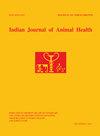沙特阿拉伯部分地区感染当地兔子(Oryctolagus cuniculus)的艾美拉菌属的流行率、形态和组织病理学变化比较
IF 0.5
4区 农林科学
Q4 AGRICULTURE, DAIRY & ANIMAL SCIENCE
引用次数: 0
摘要
背景:寄生虫感染是兔群中常见的流行病,对公共卫生构成重大威胁。兔球虫病是由细胞内原生动物寄生虫引起的感染,属于Eimeria属,被认为是导致重大发病和死亡的主要原因。研究方法从沙特阿拉伯利雅得市、Al Kharj 和 ADilam 共收集了 210 份成年家兔(Oryctolagus cuniculus)的新鲜粪便样本,通过显微镜检查艾美耳病的感染率。粪便通过漂浮技术浓缩。然后,将新鲜收集的无孢子卵囊悬浮在 2.5%(W/V)重铬酸钾中,置于培养皿中,在室温(25±3oC)下进行孢子培养。使用奥林巴斯显微镜(BX51ggTF,OLYMPUS,日本东京),使用油浸镜头研究孢子化卵囊的形态和特异性。标本取自肠道和肝脏的所有部位,将组织立即置于 10%福尔马林中保存,并制作组织切片,在光学显微镜下研究组织病理学变化。结果:在利雅得地区的三个城市(利雅得、哈吉和阿迪拉姆)进行了一项调查,以确定寄生于当地兔子(Oryctolagus cuniculus)体内的艾美拉菌的发病率。利雅得市兔子的球虫病总发病率为 45.7%,阿迪拉姆市为 44.2%,哈尔季市为 37.1%。Eimeria有五种不同的种类:E. magna、E. flavescens、E. exigua、E. striedae 和 E. coecicola。单一感染 13/90 (14.4%),双重感染 39/90 (43.3%),三重感染 38/90 (42.2%)。分别为 E. magna、E. flavescens、E. exigua、E. stiedae 和 E. coecicola。兔子之间的感染率存在显著差异(P 小于 0.05)。空肠、回肠、盲肠、盲肠末端和肝脏中寄生阶段的发展所引起的组织病理学变化证实了影响肝脏的艾美拉虫感染。可以得出的结论是,目前的研究提供了相关信息,有助于确定潜在的感染情况和未来的兔球虫病预防措施,以减少养兔业的经济损失。本文章由计算机程序翻译,如有差异,请以英文原文为准。
A Comparison in Terms of Prevalence, Morphological and Histopathological Changes between Eimeria spp. that Infect Local Rabbits (Oryctolagus cuniculus) in Some Regions of Saudi Arabia
Background: The epidemiology of parasitic infections is common in rabbit flocks and poses a significant threat to public health. And the most famous and influential of these causes are coccidia parasites, Coccidiosis in rabbits is an infection caused by intracellular protozoan parasites belonging to Eimeria, which is considered a major cause of significant morbidity and mortality. Methods: A total of 210 fresh feces samples of adult domestic rabbits (Oryctolagus cuniculus) were collected from Riyadh City, Al Kharj and ADilam in Saudi Arabia to examine the incidence of the Eimeria infection of microscopically. Feces concentrated by the floatation technique. After that, freshly collected non-sporulated oocysts were suspended in 2.5% (W/V) potassium dichromate, placed in Petri dishes in the air, and allowed to sporulate at room temperature (25±3oC). The morphometric and specific characteristics of sporulated oocysts were studied by an Olympus microscope (BX51ggTF, OLYMPUS, Tokyo, Japan) using the oil immersion lens. Specimens were taken from all parts intestine and liver, and the tissues were kept in 10% formalin immediately and make tissue sections and that to study the histopathological change under light microscopic. Result: An investigation was conducted in three cities in the Riyadh area (Riyadh, Al Kharj and Adilam) to determine the incidence of Eimeria species that parasitize local rabbits (Oryctolagus cuniculus). The overall frequency of these coccidial illnesses in rabbits in Riyadh City was 45.7%, in Adilam City it was 44.2% and in Al Kharj City it was 37.1%, respectively. There were five different species of Eimeria: E. magna, E. flavescens, E. exigua, E. striedae and E. coecicola, respectively. More than one species of Eimeria oocyst was obtained in the same examined sample. single-infection 13/90 (14.4%), dual-infection 39/90 (43.3%) and triple-infection 38/90 (42.2%). E. magna; E. flavescens; E. exigua; E. stiedae and E. coecicola, respectively. Significant differences (p less than 0.05) in prevalence were observed between the rabbits. Eimeria infection that affects the liver was confirmed by histopathological changes that were noted through the development of parasitic stages in the jejunum, ileum, cecum, end cecum and liver. It is possible to conclude that the current research offers pertinent information that aids in determining potential infection and future preventative measures against rabbit coccidiosis to lessen financial losses in the rabbit industry.
求助全文
通过发布文献求助,成功后即可免费获取论文全文。
去求助
来源期刊

Indian Journal of Animal Research
AGRICULTURE, DAIRY & ANIMAL SCIENCE-
CiteScore
1.00
自引率
20.00%
发文量
332
审稿时长
6 months
期刊介绍:
The IJAR, the flagship print journal of ARCC, it is a monthly journal published without any break since 1966. The overall aim of the journal is to promote the professional development of its readers, researchers and scientists around the world. Indian Journal of Animal Research is peer-reviewed journal and has gained recognition for its high standard in the academic world. It anatomy, nutrition, production, management, veterinary, fisheries, zoology etc. The objective of the journal is to provide a forum to the scientific community to publish their research findings and also to open new vistas for further research. The journal is being covered under international indexing and abstracting services.
 求助内容:
求助内容: 应助结果提醒方式:
应助结果提醒方式:


